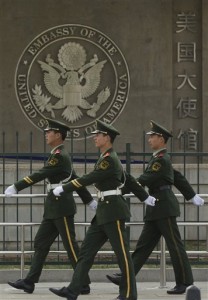My only concern is that China acts like a parent who seems to think her only duty is to feed and clothe her child – all guidance about and regard for right and wrong be damned…
The one thing every brutal dictator who fell during the Arab Spring could count on was China’s tacit, and sometimes overt, support… It behooves the black countries of Africa and the Caribbean that are sucking up to China these days as a more generous Sugar Daddy than the United States to appreciate that if the Apartheid government of South Africa were still in power China would have no qualms about doing business with it too.
(“China’s Deficit: No Moral Authority to Lead,” The iPINIONS Journal, November 16, 2011)
I wrote the above as part of a commentary warning (developed and undeveloped) countries about blithely entering into loan-sharking relationships with China. But China’s amoral conduct in foreign relations is salutary compared to its conduct in domestic relations – as Tiananmen Square and a litany of other civil and human rights abuses will attest.
This compels one to question why the United States continues its trade embargo against Cuba, but trades with China? The answer of course is obvious. But the United States is now being hoisted by its own petard over the moral hypocrisy inherent in its relationship with China.
 Because just last week one of China’s most famous dissidents, Chen Guangcheng, sought refuge in the U.S. embassy in Beijing. Chen is a lawyer who had been under house arrest for exposing the horrors of forced abortions and sterilizations pursuant to the government’s notorious one-child policy.
Because just last week one of China’s most famous dissidents, Chen Guangcheng, sought refuge in the U.S. embassy in Beijing. Chen is a lawyer who had been under house arrest for exposing the horrors of forced abortions and sterilizations pursuant to the government’s notorious one-child policy.
Now the United States must decide whether to hand him over (as China is demanding), grant him indefinite refuge (as every human rights organization is urging), or negotiate a mutually face-saving compromise worthy of King Solomon (as both countries are undoubtedly trying to do).
Apropos of a compromise, reports are that, instead of asylum, Chen is merely seeking U.S. guarantees of safety and freedom of movement as he continues his human rights crusade in China. But he is naive and sadly misguided if he thinks the United States can honor such guarantees. Because the only thing it has the power to do is pay lip service and offer paper guarantees in this respect.
So if Chen insists on staying in China, the United States will have no choice but to hand him over to China’s own devices. His blindness clearly elevates not only the moral imperative but also the humanitarian pathos inherent in this standoff. This is why resolving it to his satisfaction will be so difficult, if not impossible.
Of course, one can be forgiven for thinking that the United States will simply hand Chen over the way it did the Chongqing police chief who sought asylum just a few months ago. But the United States can fairly distinguish that case by arguing that, far from being a political prisoner or dissident, this chief was actually trying to avoid the political and legal consequences of his role in the still-unfolding corruption scandal and murder mystery involving the erstwhile most popular politician in China, Bo Xilai.
 Some Western analysts are proffering that if former President Reagan could negotiate the release of political prisoner Natan Sharansky from a gulag in the Soviet Union, surely President Obama can negotiate refuge for this political dissident.
Some Western analysts are proffering that if former President Reagan could negotiate the release of political prisoner Natan Sharansky from a gulag in the Soviet Union, surely President Obama can negotiate refuge for this political dissident.
Except that Reagan had Soviet spies in U.S. custody to trade for Sharansky. By contrast, there’s probably nothing Obama can offer to help China save face after allowing this internationally acclaimed blind man to escape house arrest in Shandong province and make it 300 miles to the U.S. embassy in Beijing….
These analysts are also predicting a full-scale diplomatic freeze between the United States and China when Secretary of State Hillary Clinton arrives in Beijing tomorrow for previously scheduled meetings. I disagree; not least because China has always proselytized the pragmatic philosophy that human rights issues should never interfere with the conduct of business between nations.
All the same, it speaks volumes about what China as a superpower portends that the United States is having to go back to the future to deal with it today the way it dealt with the Soviet Union during the Cold War.
Related commentaries:
China deficit…
China’s purging of Bo Xilai